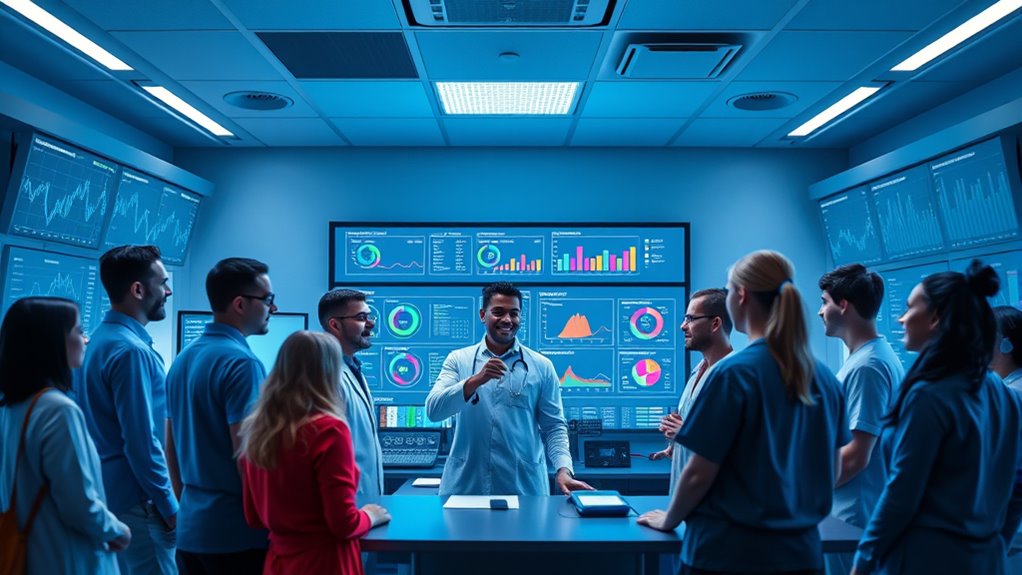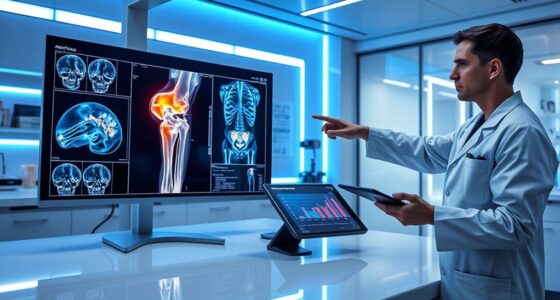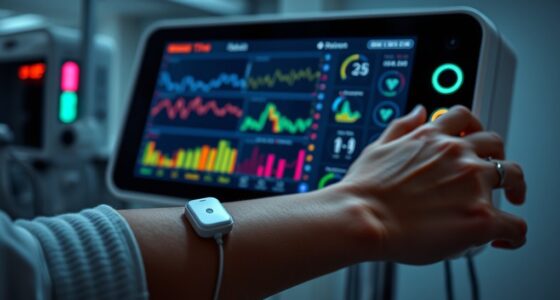Georgia’s medical networks are adopting AI tools to improve your well-being and reduce burnout. These solutions, such as ambient documentation, automatically capture conversations and draft notes, freeing up your time and easing mental load. Early results show significant declines in burnout and better mental health without increasing intentions to leave. By implementing these innovations, you’ll see how AI is transforming healthcare for staff and patients alike. Keep exploring to discover more about this promising shift.
Key Takeaways
- Northeast Georgia Health System (NGHS) has implemented AI tools, including DAX Copilot, to support clinicians and improve workflow.
- AI-driven ambient documentation reduces clinician burnout, with burnout rates dropping from above 50% to around 30%.
- Positive impacts on healthcare worker well-being increased significantly after AI deployment, enhancing mental health and job satisfaction.
- Healthcare providers are developing AI literacy and ethical skills to ensure responsible AI use and workforce development.
- Non-clinical AI applications, like chatbots and diagnostic support, further reduce workload and promote well-being across Georgia’s medical network.

Georgia’s medical networks are increasingly turning to artificial intelligence to support their healthcare workforce. Northeast Georgia Health System (NGHS) is leading the way by piloting AI tools designed to ease clinician workload and reduce burnout. Over 480 clinicians have been trained to use DAX Copilot, an AI-powered assistant that captures patient conversations ambiently and drafts notes automatically. This tool integrates seamlessly with Epic’s electronic health records, streamlining documentation and streamlining documentation and cutting down on screen time. Early results show clinicians experience less cognitive burden and have more time for patient care, which can markedly improve their work-life balance.
Using ambient AI documentation has proven effective in reducing burnout. Studies indicate that burnout rates among clinicians dropped from above 50% to roughly 30% within 42 to 84 days of AI implementation. At Emory University, clinicians reported a sharp increase in the positive impact of documentation on their well-being—from just 1.6% noticing benefits before AI to over 32% after 60 days of use. Importantly, these improvements haven’t led to increased intentions to leave clinical roles, suggesting AI helps retain staff by making their work less stressful. While some report enhanced professional fulfillment, not all results are statistically meaningful, but the trend points toward better mental health for healthcare workers. Additionally, ongoing research emphasizes the importance of ethical AI use to prevent unintended negative consequences.
To maximize AI’s benefits, healthcare professionals are developing new skills. AI literacy, practical training, and ethical considerations are becoming essential components of workforce development. This training aims to empower staff to confidently use AI-enabled systems, from automating routine administrative tasks to supporting clinical decision-making. Non-clinical applications like chatbots handle scheduling, triage, and language translation, further improving operational efficiency. In addition, AI tools assist radiologists in analyzing diagnostic images, helping detect diseases early and saving lives. NGHS’s active deployment of AI solutions demonstrates its commitment to innovative healthcare delivery.
Frequently Asked Questions
How Does AI Personalize Employee Well-Being Programs?
AI personalizes employee well-being programs by analyzing data from wearables, health records, and surveys to create detailed health profiles. It detects risks and patterns, adjusting recommendations in real-time. AI chatbots offer tailored mental health support, while activity and sleep data guide personalized fitness plans. It also predicts health risks early, enabling targeted interventions. This continuous, data-driven approach guarantees programs meet individual needs effectively and dynamically.
What Privacy Measures Protect Staff Data in AI Systems?
You can trust AI to protect staff data by using advanced privacy measures like federated learning, which keeps raw data local and only shares model insights. Differential privacy adds noise to data, preventing identification of individuals. Encryption techniques, such as Homomorphic Encryption, secure data during processing. These methods make certain your information stays confidential, addressing privacy concerns while enabling AI to personalize programs effectively and ethically.
Can AI Detect Burnout Earlier Than Traditional Methods?
Yes, AI detects burnout earlier than traditional methods. It continuously monitors real-time data like work hours, physiological signs, communication patterns, and job satisfaction, identifying subtle signs that may signal impending burnout. Unlike surveys that rely on delayed self-reporting, AI provides proactive alerts, enabling you to intervene early. This early detection helps prevent full-blown burnout, improving workforce well-being and maintaining high-quality patient care.
How Will AI Impact Staffing Levels and Workload?
AI will markedly impact staffing levels and workload by automating routine tasks, freeing you from administrative burdens, and allowing you to focus more on patient care. It provides real-time staffing recommendations, helping prevent shortages and overstaffing. AI also monitors workload and burnout risks, enabling timely interventions. This leads to more balanced schedules, reduced stress, and improved job satisfaction, ultimately ensuring you can deliver quality care efficiently and sustainably.
What Training Is Provided for Staff to Adapt to AI Tools?
You receive thorough AI training that includes online programs, live webinars, and practical projects to build your skills. You’ll learn about AI systems, ethical considerations, and how to integrate AI into healthcare workflows. Interactive tools like chatbots, VR modules, and personalized coaching help you apply knowledge effectively. Continuous education ensures you’re up-to-date, enabling you to adapt confidently and leverage AI tools to improve patient care and streamline your workload.
Conclusion
You might think AI could replace human touch, but Georgia Medical Network proves it’s here to support, not replace, healthcare workers. By embracing AI for workforce well-being, you can reduce burnout and improve work conditions without losing the personal care that patients value. It’s about empowering you with tools that enhance your job, not diminish it. So, trust that AI is a partner, helping you deliver better care while taking care of yourself.











